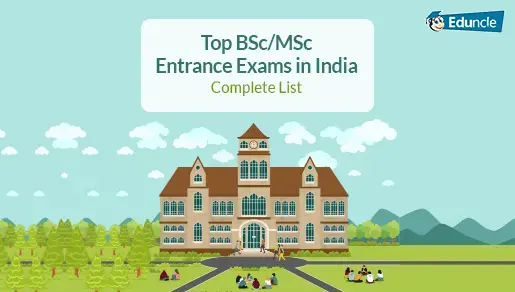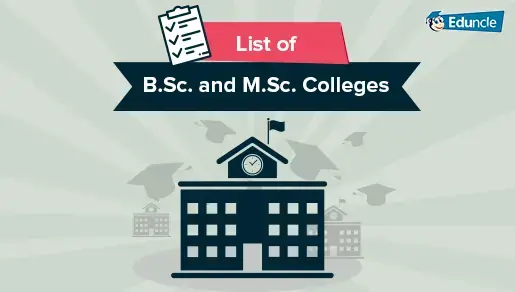
After pursuing a bachelor’s degree, most of the candidates go for higher studies, i.e., masters’ degrees. But it’s very confusing for a science student to know which degree they will go for, MS or MSc degree.
As the full forms of these two degrees look pretty similar, i.e., Master of Science, most candidates come up with queries like:
What is the difference between MS and M.Sc. Degree?
What is an MS degree? Is it better than an MSc Degree?
How is an MS degree different from an M.Sc. degree?
To satisfy their queries and provide the best guidance, we have summed up all the major differences between MS and M.Sc. into this blog.
Let’s have a look at the glimpses of M.Sc. vs MS –
Difference between MS and M.Sc
List of Entrance Exams to Pursue these Degrees!
Eligibility Criteria to Pursue the Degree!
Difference between MS and M.Sc Degree Specializations
Specializations of M.Sc. Degree
List of Institutes Offering these Courses!
Best Institutes offering MS Degree
Best Institutes offering M.Sc. Degree
Career Options After Pursuing these Degrees!
Career Options after pursuing M.Sc
Career Options after pursuing MS
The full form of MS and M.Sc. are same, but these two degrees are different.
MS is a professional course, whereas M.Sc. covers a broad knowledge and skills.
Candidates who have completed their M.Sc. degree can also pursue an MS degree. But MS Degree holders usually don’t go for an M.Sc. degree.
Candidates may also get a chance to study abroad to pursue an MS degree. But it’s not the same with an M.Sc. degree.
Candidates who wish to pursue an M.Sc. degree should have a B.Sc. degree in any science subject. But the candidates who have pursued their bachelor’s degree in any matter can pursue an MS degree.
Well, these are the basic differences between MS and M.Sc. degrees. So, if you want to know all the major differences and other important details regarding MS vs M.Sc. degree, you should read this complete blog.
So, Let’s get to know those factors.
Difference between MS and M.Sc - Factors Which Make Them Different From Each Other!
Many science students who have pursued their Bachelor’s degree get confused about higher studies. Choosing the right PG course is a big task for them.
So, to help those students, we have provided the factors based on which they can choose the best between MS and M.Sc.
Enlisted below are those factors:
Institutes Offering the Course
List of Entrance Exams to Pursue these Degrees!
With the list of entrance exams provided below, you can easily choose the right entrance exam to appear for the course. Entrance Exams for MS and M.Sc. degree is different. So, below we have provided the list of Entrance Exams for both degrees.
Enlisted below are the best entrance exams you may appear to get admission in M.Sc. Courses:
NEST (National Entrance Screening Test)
About IIT JAM (Joint Admission Test for Masters)
GSAT (GITAM Science Admission Test)
MCAER CET
OUAT Entrance Exam
Enlisted below are the best entrance exams that you may appear to get admission in MS Courses:
GRE (Graduate Record Examination)
TOEFL (Test of English as a Foreign Language)
IELTS (International English Language Testing System)
After getting aware of the entrance exams, you should check all the eligibility conditions required to pursue MS and M.Sc. degree.
Eligibility Criteria to Pursue the Degree!
This is one of the major differences between MS and M.Sc. degrees. Most of the candidates think that clearing an entrance exam would give them admission to MS and M.Sc. programs. But only clearing an entrance exam is not enough. You must satisfy all the other eligibility conditions required to pursue a master’s degree.
So, below we have provided all the eligibility conditions required to pursue these courses.
Eligibility for M.Sc:
To pursue an M.Sc. degree, all you need is a bachelor’s degree in Science, i.e., B.Sc. with a minimum cut-off mark (as stated by the respective college/ university). There is no age limit to pursue an M.Sc. degree.
Note: Eligibility Criteria for M.Sc. may vary with different colleges depending on their policy.
Check out the IIT JAM Eligibility to get admission to the M.Sc. course of Indian Institutes of Technology.
Eligibility for MS:
To pursue an MS degree, you need a Bachelor’s degree in any field from a recognized college/university. You need to have completed 16 years of previous education to pursue the MS degree.
So, qualification of 10+2+4 year degree program, 10+3 year diploma + 3-year degree program or 10+2+ 3 year degree program and related qualifications are valid for admission in MS degree.
Difference between MS and M.Sc Degree Specializations
If you want to pursue the MS and M.Sc. degree, it is crucial to know the specializations in which you can pursue these degrees.
So, below we have provided the specializations of these two degrees.
Specializations of M.Sc. Degree:
M.Sc. in Economics
M.Sc. in Information Technology
M.Sc. in Clinical Psychology
M.Sc. in Atmospheric Science
M.Sc. in Electronics
Specializations of MS Degree:
MS in Biomedical Engineering
MS in Chemical Engineering
MS in Statistics
MS in Operations Research
MS in Computer and Information Technology
MS in Management Information Systems
MS in Environmental Engineering
MS in Systems Engineering
MS in Computer Engineering
MS in Mathematics
We cannot mention all the specializations as there is a big list of specializations of both these degrees. So, we have mentioned only the major and popular specializations over here.
List of Institutes Offering these Courses!
Getting admission to the top colleges/institutes is every student’s dream. Everyone wants to be a part of those institutes. Candidates pursuing MS, M.Sc. degrees may look for the best institutes for admission.
So, to help those students, we have provided the list of best institutes which offer these courses.
This is also the same with the list of Institutes. There are many institutes which offer these courses. So, we have only provided the list of best institutes providing these courses.
Best Institutes offering MS Degree:
Massachusetts Institute of Technology, Cambridge, USA
Stanford University, Stanford, USA
Georgia Institute of Technology, Atlanta, USA
California Institute of Technology, Pasadena, USA
Technical University of Munich, Munich, Germany
University of Stuttgart, Stuttgart, Germany
University of Minnesota, Twin Cities, Minneapolis, USA
The Ohio State University, Columbus, USA
Loughborough University, Leicester, UK
Technical University of Berlin, Berlin, Germany
Best Institutes offering M.Sc. Degree:
Indian Institute of Technology, Bombay
Indian Institute of Technology, Roorkee
Indian Institute of Technology, Madras
Indian Institute of Technology, Guwahati
Indian Institute of Technology, Hyderabad
Indian Institute of Technology, Kanpur
National Institute of Technology, Rourkela
National Institute of Technology, Karnataka
Lovely Professional University (LPU), Jalandhar
Loyola College, Chennai
Career Options After Pursuing these Degrees!
Most of the candidates must be interested in knowing the career options after pursuing these degrees. Below we have made a list of the best career options you can choose after pursuing MS, M.Sc. degrees.
Career Options after pursuing M.Sc:
1. You can apply for Research or Scientists Jobs in Government Owned Scientific Research and Development Organizations such as –
Defense Research and Development Organization (DRDO)
Physical Research Laboratory Ahmedabad
Nuclear Science Centre New Delhi
Saha Institute of Nuclear Physics Kolkata
Bhabha Atomic Research Centre (BARC)
Indian Space Research Organization (ISRO)
2. Officer Jobs in the following Organizations:
Oil and Natural Gas Corporation (ONGC)
Bharat Heavy Electricals Limited (BHEL)
National Thermal Power Corporation (NTPC)
Indian Oil Corporation Limited (IOCL)
Bharat Petroleum
You can become a professor at India’s Top Most Universities.
You can apply for Defense Jobs.
You can get recruited in private companies like Infosys, Wipro, TCS, Nagarro, Amazon, CTS, etc.
You may get a private sector Energy & Power Plants job.
You can even apply for Teaching Jobs.
You may also go for higher studies after pursuing M.Sc. such as Ph.D.
Career Options after pursuing MS:
You can become a School counsellor, academic counsellor, or academic advisor.
You can work with youth, adults, or a geriatric population in a wide range of professional settings, including:
Community mental health centres
Wellness centres
Public or private hospitals and healthcare settings
Domestic violence, emergency, and homeless shelters
Residential treatment centres
Correctional facilities
Child and family service agencies
You can apply for senior-level or leadership positions in big data analytics, engineering, programming, security, and systems architecture.
You can also apply for a Banking Sector Job.
Average Salary and Pay Scale!
After talking about the career options, most of the candidates will look for the Salary and Pay Scale they get after pursuing these degrees: MS vs M.Sc. The average salary for an M.Sc. degree holder is INR 20,000 to INR 30,000 per month. But companies may offer a higher salary package based on the candidates’ qualifications and work experience.
Salaries will depend on various factors, including your qualification, company's size, which sector the company is from, your working experience, etc.
More the experience you have, the higher the salary package you get.
The average salary for an MS degree holder is almost the same. The salary package may vary with different posts.
So, we have provided all the major differences between MS and M.Sc. degrees. Now you should have a clear idea about these two degrees, and you can now choose the best for you.
Please share this article with your friends who are also confused about whether they should go for MS or M.Sc.
If you have any queries/doubts regarding this article, you can comment in the comments section given below.
Thank You!


















